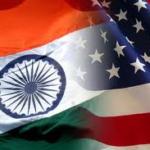 The state visit to New Delhi by Chinese Premier Wen Jiabao in December 2010 focused on the potential for mutual economic cooperation. Wen arrived with a large business delegation that promptly signed some $16 billion worth of deals. The two governments also pledged to take their $60-billion trade relationship to the $100-billion level by 2015.
The state visit to New Delhi by Chinese Premier Wen Jiabao in December 2010 focused on the potential for mutual economic cooperation. Wen arrived with a large business delegation that promptly signed some $16 billion worth of deals. The two governments also pledged to take their $60-billion trade relationship to the $100-billion level by 2015.
But the India-China narrative in 2011 was more about strategic competition than economic collaboration. Two events over the last month or so signify how long-standing disputes along their Himalayan frontier have increasingly come to the fore. The first is the abrupt cancellation of border talks due to Beijing’s concerns about the Dalai Lama’s activities inside India. The second is the alarm sounded in the Indian parliament by Mulayam Singh Yadav, a former defense minister, that China is on the verge of launching an attack.
New Delhi’s strategic activism in East Asia and the reactions it has elicited in Beijing were also on display this year. During his state visit last year, President Barack Obama urged India not only to “look East” but also “to engage East” for the sake of enhanced security and prosperity throughout Asia. Secretary of State Hillary Rodman Clinton echoed this message during her own trip to India this past July.
The advice was seemingly taken to heart when the Indian government, in defiance of explicit Chinese warnings, proceeded with hydrocarbon exploration in the South China Sea, an area Beijing assertively claims in almost its entirety. New Delhi also moved to solidify security relations with Vietnam, a Chinese nemesis, and to strengthen its influence in Myanmar, which China and India have long regarded as an arena for geopolitical jousting. Last week’s visit to New Delhi by Japanese Prime Minister Yoshihiko Noda capped off a year that saw a tightening strategic partnership between the two countries.
Central to the “Delhi disillusionment” that now prevails in Washington are questions about whether the nuclear cooperation accord has succeeded in invigorating U.S.-India geopolitical cooperation in the face of a rapidly growing and more assertive China. But events over the last month demonstrate that a strategic entente focused on Beijing is slowly coming together. The United States, India and Japan in mid-December held their first trilateral meeting on security issues in East Asia. Nirupama Rao, the Indian ambassador in Washington, has stated that New Delhi will use this dialogue to bolster its engagement in the region.
A trilateral security effort (here and here) also seems to be congealing among the United States, India and Australia, even if New Delhi remains wary of a formal arrangement. And within its strategic backyard, India has started a tripartite security dialogue with Sri Lanka and Maldives that has China as a focus.
As a previous post noted, 2012 will not be a year of grand initiatives in U.S.-India relations. But officials in Washington and New Delhi should use the next 12 months to focus on two eminently accomplishable projects:
(An earlier version of this post appeared at http://www.usinpac.com)